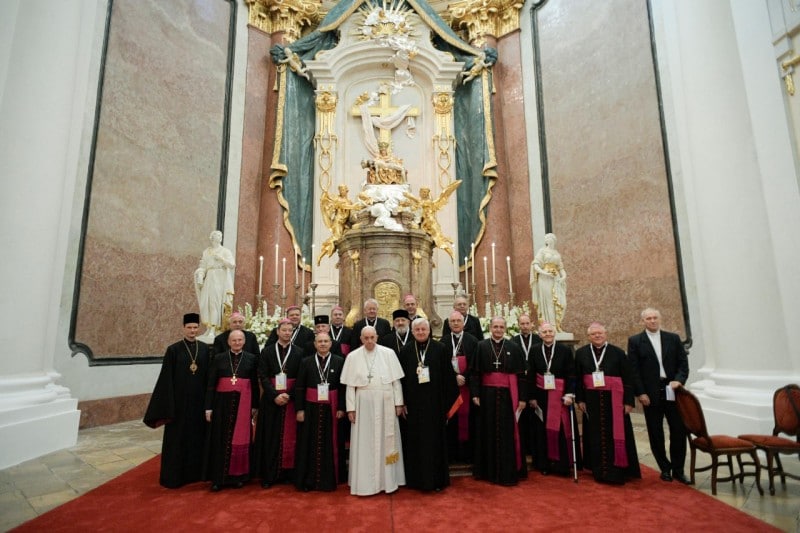Pope Francis shared a private Moment of Prayer with the Bishops of Slovakia on Wednesday morning at the National Shrine of Our Lady of Seven Sorrows in Šaštín, a small town located in the Senica district in the Trnava region.
The Holy Father and the Bishops recited a Prayer of Entrustment to Our Lady and an Our Father, followed by a concluding prayer from Pope Francis.
Wednesday, the last day of the Pope’s 34th Apostolic Visit, September, 15, is the liturgical Feast of Our Lady of Sorrows, the patroness of Slovakia.
National Shrine of Our Lady of Seven sorrows
The beginnings of the National Shrine in Šaštín dates back to the 16th Century, when a noblewoman, Angelika Bakičová, asked for the intercession of Our Lady so that her husband, Count Imrich Czobor, lord of the territory of Šaštín – an irascible man – would turn a new leaf, according to Vatican News.
In gratitude for her answered prayers, she had a statue of the Blessed Virgin Mary made and placed at a small chapel. Soon after, many people began to stop in prayer at the chapel and it became a popular place for pilgrims.
Notable visitors to the Basilica of Our Lady of Seven Sorrows include St. Teresa of Calcutta on 6 June 1987 and Pope St. John Paul II on 1 July 1995.
Following are the prayers from the event:
The Holy Father:
In the name of the Father, and of the Son, and of the Holy Spirit.
R/. Amen.
Glory be to the Father, and to the Son, and to the Holy Spirit.
R/. As it was in the beginning, is now, and will be forever. Amen.
The Holy Father and the Bishops together recite the Prayer of Entrustment:
Our Lady of the Seven Sorrows,
we are gathered here in your presence as brothers,
grateful to the Lord for his merciful love.
And you are here with us,
as you were with the Apostles in the Upper Room.
Mother of the Church, Consoler of the Afflicted,
with confidence we turn to you,
in the joys and struggles of our ministry.
Look upon us with tenderness
and open your arms to embrace us.
Queen of the Apostles, Refuge of Sinners,
you know our human limitations,
our spiritual failings,
our sorrow in the face of loneliness and abandonment:
with your gentle touch heal our wounds.
Mother of God, our Mother,
to you we entrust our lives and our nation.
To you, we entrust our episcopal communion.
Obtain for us the grace
faithfully to put into practice each day
the words your Son taught us,
the words that, in him and with him,
we now lift up to God our Father.
The Holy Father and the Bishops:
Our Father, who art in heaven,
hallowed be thy name,
thy kingdom come,
thy will be done,
on earth as it is in heaven.
Give us this day our daily bread,
and forgive us our trespasses,
as we forgive those who trespass against us;
and lead us not into temptation,
but deliver us from evil.
The Holy Father:
O God, you invite your Church,
in imitation of the Blessed Virgin Mary,
to contemplate the passion of Christ.
Grant that, by her intercession,
we may be ever more conformed
to your only-begotten Son
and attain to the fullness of his grace,
who lives and reigns for ever and ever.
R/. Amen.
The Holy Father:
Let us bless the Lord.
R/. Thanks be to God.
© Libreria Editrice Vatican










